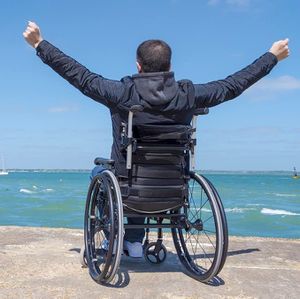Wheelchair Service Provision Course - Evaluation Report
This article or area is currently under construction and may only be partially complete. Please come back soon to see the finished work! (6 June 2024)
Summary[edit | edit source]
In September/October 2018 Physiopedia and the International Committee of the Red Cross (ICRC) successfully delivered the Wheelchair Service Provision Massive Open Online Courses (Wheelchair MOOC) via the Physioplus online learning platform. This programme of four courses and optional written assignment were based on the “Guidelines on the provision of manual wheelchairs in less-resourced settings” developed by the World Health Organisation (WHO). In collaboration with Humanity & Inclusion (HI) a French version of the programme of courses was delivered concurrently.
Course Type - Open, Online
Course Coordinators - Rachael Lowe, Barbara Rau, Martin Jacobs
Collaborating Partners - Physiopedia, the ICRC and HI
About this course - This online programme of four courses provides a comprehensive theoretical understanding of Wheelchair Service Provision including the theoretical principles, skills and knowledge underlying the management skills and knowledge in the management of wheelchair service delivery. There was an English and a parallel French version of the programme of courses.
Who were the courses aimed at - These courses were written for physiotherapy clinicians, students and assistants; other healthcare professionals interested in this subject were welcomed to participate.
Time commitment - 17 hours over 4 weeks
Date – 1 September to 31 October 2018 (the course remains available on the Physioplus platform to members)
Requirements – Participants were required to complete online learning activities, engage with additional resources, take part in the conversation online and complete the course evaluation. Assessment - There was a final quiz and participants could optionally complete an assignment to demonstrate their learning.
Awards - 4 course completion certificates awarding a total of 17 Physioplus (P+) points. Accreditation - The courses were accredited by the Australian Physiotherapy Council, the South African Society of Physiotherapy (total 22 CEUs) and The Federation of State Board of Physical Therapy (total 16 CEUs)
Registrations - 5,559 (5296 English programme and 263 French programme)
Countries represented - 148 (143 English programme and 28 French programme)
Acknowledgements[edit | edit source]
The Wheelchair Service Provision MOOC was developed as a collaboration between Physiopedia and ICRC. Physiopedia and ICRC provided funding. The “Guidelines on the provision of manual wheelchairs in less-resourced settings” developed by the World Health Organisation were used as the basis for these courses. HI completed the French translation of the programme of courses.
Course coordinators:[edit | edit source]
- Rachael Lowe, Physiopedia
- Barbara Rau, ICRC
- Martin Jacobs, HI
Content contributors:[edit | edit source]
- Naomi O’Reily, Physiopedia
- Lee Kirby, Wheelchair Skills Program
- Perth Rosen, UCP Wheels for Humanity
- Yasmin Garcia, UCP Wheels for Humanity
- Karen Wilson, Physiopedia
- Priya Gulla, Physiopedia
- Ilona Malkauskaite, Physiopedia
- Daniele Barrilla, Physiopedia
- Mereena Baby, Physiopedia
- Vidya Acharya, Physiopedia
- Simisola Ajeyalemi, Physiopedia
- Mariam Hashem, Physiopedia
Course facilitators:[edit | edit source]
- Naomi O’Reily, Physiopedi
- Nicky Seymour, Motivation
- Patience Mutiti, Motivation
- Abder Banoune, HI
- Elia Bernabeu Mira, ICRC
- Subhash Sinha, ICRC
- Sidhu Mi, ICRC
Special thanks to Naomi O’Reily for managing the content and course development.
For any information regarding this report, please contact: Rachael Lowe - [email protected]
Introduction[edit | edit source]
During September and October 2018 Physiopedia ran their seventh Massive Open Online Course titled Wheelchair Service Provision (Wheelchair MOOC). This was delivered as a programme of four courses and an optional written final assignment. These courses were developed as a collaboration between Physiopedia and ICRC. The course structure and content was based on the “Guidelines on the provision of manual wheelchairs in less-resourced settings” developed by the World Health Organisation (WHO) which was supplemented with additional material from global experts. A French version of the programme of courses, translated and facilitated by HI, ran concurrently.
The aim of the Wheelchair MOOC was to train the distributed team of ICRC staff and partners to have a basic understanding of the theoretical knowledge that underpins the provision of wheelchairs to appropriate clients in a variety of contexts. The content of the courses was designed for physiotherapists in any global context, all healthcare workers from any location and context were invited to participate. Being open for anyone to participate allowed for global conversation around the topic and enabled peer-to-peer learning across contexts and experiences.
The four week long courses presented different topics through a variety of learning activities to suit all learning styles. The required learning activities within each course were developed to take between 4-6 hours depending on the participant's learning style and optional activities were provided should the participant wish to take part in additional learning. A short orientation period before the course started provided participants with an opportunity to become familiar with the delivery platform and the topic via the provided pre-course resources.
The course was delivered through the Physioplus (P+) online learning platform, an innovative platform specifically developed to deliver online education and provide learners with a personalised learning dashboard. For each course the related learning activities were released on a specific course page. As participants engaged with each course learning activity it was recorded and displayed in their own personal learning dashboard.
To finish each of the four courses, participants were required to complete all the required learning activities and pass a final quiz that tested knowledge. Finally there was an optional course which included a written assignment to demonstrate their learning from all four courses. On completion of each course the participants could download a completion certificate and also export a record of their learning from their activity log.
This report evaluates the experiences and engagement of the participants on the Wheelchair MOOC.







